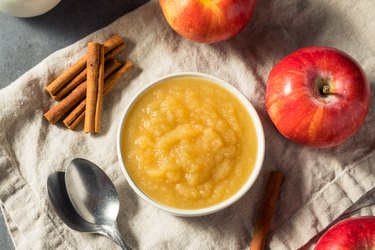

There's lots of chatter on social media on what constitutes a great pre-workout snack. And while there are many good options out there, one snack that's highly underrated yet arguably more convenient and versatile than others is applesauce.
Applesauce is primarily made of easy-to-digest carbohydrates, which are the body's main energy source, says Holley Samuel, RD, CPT, a sports dietitian and founder of Holley Fueled Nutrition. "These carbs digest quickly, providing a source of readily available energy to fuel you for a workout."
Video of the Day
Video of the Day
It's generally better to work out after you've eaten because carbohydrates aid in performance, especially during high-intensity exercise.
"If you plan on doing high-intensity exercise, it's a good idea to have some carbohydrates beforehand versus working out on an empty stomach. Our bodies cannot sustain high-intensity exercise once we start to run low on carbohydrate stores, says Marie Spano, RD, CSCS, a sports dietitian and author of Nutrition for Sports, Exercise, and Health.
The bonus is that applesauce usually comes in single-serving pouches or cups that are shelf-stable, so you can grab one on your way out the door and enjoy it right before your run or lifting session. Here's why you should stash some 'sauce in your gym bag.
4 Benefits of Applesauce Before a Workout
1. It's a Convenient Source of Carbs
Applesauce is an easy and accessible way to help meet your carbohydrate needs before a workout.
Applesauce is (obviously) made of apples, which contain carbs that break down primarily into fructose, Samuel says. Most store-bought applesauce have around 15 grams of carbs per serving.
How Many Carbs Do You Need Before a Workout?
Aim to eat 1 gram of carbs per kilogram (2.2 pounds) of body weight an hour before your workout, Spano says.
For example, if you weigh 165 pounds, you would need about 75 grams of carbs an hour before your workout. The amount of carbs you should get also depends on when you had your last meal. So if you haven’t eaten for hours, a pre-workout snack may be a good idea, Spano says.
"If any athlete is having trouble meeting their carbohydrate needs or wants to take applesauce packets during their workouts, it may actually benefit them to take applesauce pouches or applesauce that has been sweetened with sugar, as this will provide a more condensed source of carbohydrates," Samuel says.
2. It Can Aid Hydration Efforts
Depending on the brand you purchase, some applesauce contains added sugars, which can give you more calories to sustain your workout and actually help you stay hydrated during your workout.
"Some applesauce have added sugar, which breaks down into glucose and fructose. All of these simple sugars can help with the absorption of electrolytes and maintaining hydration on the run. This is why you see carbohydrates in sports drinks, too — they help with the absorption of the electrolytes in the sports drink and fluid that it is mixed with," Samuel says.
3. It Generally Won't Cause Any GI Issues
The closer you are to beginning your workout, the less fiber, fat and protein you want to eat. That's because these nutrients take longer to digest than carbohydrates.
"If something is taking too long to digest and is remaining in the stomach as you start your workout, you're more likely to experience GI issues," Samuel says. Read: Eating fat, fiber and protein before a workout may lead to gas, bloating and heartburn.
Because applesauce is generally low in fiber, protein and fat, it's a good pre-workout snack option.
Tip
When shopping for applesauce, you'll notice some brands will combine apples with other fruits and vegetables, which may increase the amount of fiber and lead to GI issues. So if you're a runner or have a sensitive stomach, you may want to avoid applesauce pouches that have veggies added.
Typical applesauce has about 7 to 11 percent of the fiber DV per serving, so make sure not to exceed that in your snack, Spano says.
4. It Provides Some Nutrients
Applesauce also offers small amounts of micronutrients and minerals your body needs. Although the small amounts of these nutrients won't have a significant effect on your performance, they can contribute to your overall daily intake.